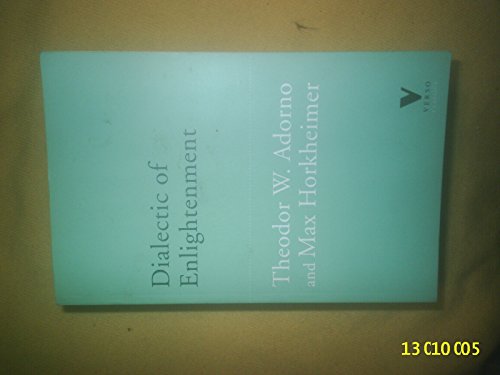Articles liés à Dialectic of Enlightenment

Synopsis
Covre worn, some pencilled notes in margins. Shipped from the U.K. All orders received before 3pm sent that weekday.
Les informations fournies dans la section « Synopsis » peuvent faire référence à une autre édition de ce titre.
Présentation de l'éditeur
Dialectic of Enlightenment is undoubtedly the most influential publication of the Frankfurt School of Critical Theory. Written during the Second World War and circulated privately, it appeared in a printed edition in Amsterdam in 1947. What we had set out to do, the authors write in the Preface, was nothing less than to explain why humanity, instead of entering a truly human state, is sinking into a new kind of barbarism. Yet the work goes far beyond a mere critique of contemporary events. Historically remote developments, indeed, the birth of Western history and of subjectivity itself out of the struggle against natural forces, as represented in myths, are connected in a wide arch to the most threatening experiences of the present. The book consists in five chapters, at first glance unconnected, together with a number of shorter notes. The various analyses concern such phenomena as the detachment of science from practical life, formalised morality, the manipulative nature of entertainment culture, and a paranoid behavioral structure, expressed in aggressive anti-Semitism, that marks the limits of enlightenment. The authors perceive a common element in these phenomena, the tendency toward self-destruction of the guiding criteria inherent in enlightenment thought from the beginning. Using historical analyses to elucidate the present, they show, against the background of a prehistory of subjectivity, why the National Socialist terror was not an aberration of modern history but was rooted deeply in the fundamental characteristics of Western civilization. Adorno and Horkheimer see the self-destruction of Western reason as grounded in a historical and fateful dialectic between the domination of external nature and society. They trace enlightenment, which split these spheres apart, back to its mythical roots. Enlightenment and myth, therefore, are not irreconcilable opposites, but dialectically mediated qualities of both real and intellectual life. "Myth is already enlightenment, and enlightenment reverts to mythology." This paradox is the fundamental thesis of the book. This new translation, based on the text in the complete edition of the works of Max Horkheimer, contains textual variants, commentary upon them, and an editorial discussion of the position of this work in the development of Critical Theory.
Présentation de l'éditeur
Theodor Adorno and Max Horkheimer are the leading figures of the Frankfurt School and this book is their magnum opus. Dialectic of Enlightenment is one of the most celebrated works of modern social philosophy and continues to impress in its wide-ranging ambition. Writing just after World War II and reflecting on the bureaucracy and myths of National Socialism and the inanity of the dawn of consumerism, Adorno and Horkheimer addressed themselves to a question which went to the very heart of the modern age: 'why mankind, instead of entering into a truly human condition, is sinking into a new kind of barbarism . Modernity, far from redeeming the promises and hopes of the Enlightenment, had resulted in the stultification of mankind and administered society, characterized by simulation and candy-floss entertainment. Tracing humanity's modern fall to the very rationality that was to be its liberation, the authors exposed the domination and violence that underpin the Enlightenment project.
Les informations fournies dans la section « A propos du livre » peuvent faire référence à une autre édition de ce titre.
- ÉditeurVerso Books
- Date d'édition1997
- ISBN 10 1859841546
- ISBN 13 9781859841549
- ReliureBroché
- Langueanglais
- Nombre de pages270
EUR 13,96 expédition depuis Royaume-Uni vers Etats-Unis
Destinations, frais et délaisAcheter neuf
Afficher cet articleGratuit expédition vers Etats-Unis
Destinations, frais et délaisRésultats de recherche pour Dialectic of Enlightenment
Dialectic of Enlightenment (Volume 15)
Vendeur : Anybook.com, Lincoln, Royaume-Uni
Etat : Good. Volume 15. This is an ex-library book and may have the usual library/used-book markings inside.This book has soft covers. In good all round condition. Please note the Image in this listing is a stock photo and may not match the covers of the actual item,450grams, ISBN:9781859841549. N° de réf. du vendeur 9966609
Quantité disponible : 1 disponible(s)
Dialectic of Enlightenment: 15 (Verso Classics)
Vendeur : Anybook.com, Lincoln, Royaume-Uni
Etat : Good. This is an ex-library book and may have the usual library/used-book markings inside.This book has soft covers. In good all round condition. Please note the Image in this listing is a stock photo and may not match the covers of the actual item,450grams, ISBN:9781859841549. N° de réf. du vendeur 8241392
Quantité disponible : 1 disponible(s)
Dialectic of Enlightenment: 15 (Verso Classics)
Vendeur : Orb's Community Bookshop, Huntly, Royaume-Uni
Soft cover. Etat : Good. )ne of the most celebrated and often cited works of modern social philosophy. Adorno and Horkheimer address themselves to a question that goes to the very heart of the modern age, namely "why mankind, instead of entering into a truly human condition, is sinking into a new kind of barbarism". Cover slightly worn, pages clean, although some marks on edge of pages. N° de réf. du vendeur ABE-1626787790804
Quantité disponible : 1 disponible(s)
Dialectic of Enlightenment (Verso Classics)
Vendeur : SAVERY BOOKS, Brighton, East Sussex, Royaume-Uni
Paperback. Etat : Very Good Plus. PAPERBACK 1997. 21.5x13.5cm. xvii+258 pages. Flat spine. Flat covers. Clean & tight. No inscriptions. Flat pages. Dispatched ROYAL MAIL FIRST CLASS with TRACKING next working day or sooner securely boxed in cardboard. ref O-GRY. Dialectic of Enlightenment by Theodor W. Adorno & Max Horkheimer. Translated to English by John Cumming. Verso Books, London. N° de réf. du vendeur 039070
Quantité disponible : 1 disponible(s)
Dialectic of Enlightenment
Vendeur : The Book Spot, Sioux Falls, MN, Etats-Unis
Paperback. Etat : New. N° de réf. du vendeur Abebooks467270
Quantité disponible : 1 disponible(s)

